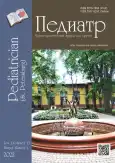Axiological component in digitalization of health care and medicine
- Authors: Nesterenko Z.V.1
-
Affiliations:
- St. Petersburg State Pediatric Medical University
- Issue: Vol 13, No 3 (2022)
- Pages: 5-13
- Section: Editorial
- URL: https://journals.eco-vector.com/pediatr/article/view/109727
- DOI: https://doi.org/10.17816/PED1335-13
- ID: 109727
Cite item
Abstract
The basis of the modern industrial revolution is digitalization and artificial intelligence due to the influence of the digitalization process on all aspects of the economy, public life, including healthcare and education. The creation of a modernized healthcare system that would meet world standards implies an increase in both the quality and accessibility of medical care, which requires new technological solutions. The development of any new technology relies on digitalization, which has led to the creation of the Internet, robots, and artificial intelligence. Digital health is a new format for the medical industry to improve the efficiency and quality of medical care. The training of modern specialists provides for a significant change in teaching methods. The dependence of the quality of medical education on the multicomponent and increasingly digital nature of social reality is obvious. Additional special training of doctors for remote work is needed, the development of curricula taking into account the digitalization of healthcare. The relevance of the problem of digitalization of higher medical education involves an analysis of the state of modernization processes in medical universities, regulations on the electronic information educational environment of the university, including electronic information and educational resources, a set of information, telecommunication technologies and technological tools. The necessity of systematizing the social effects of the digitalization of higher education and conducting appropriate prolonged studies is substantiated.
Full Text
About the authors
Zoia V. Nesterenko
St. Petersburg State Pediatric Medical University
Author for correspondence.
Email: zvnesterenro@gmail.com
ORCID iD: 0000-0001-9522-897X
MD, PhD, Dr. Med. Sci, Professor of the Department of Propediatrics Сhildhood Diseases with a Course of Care for Patients General Care
Russian Federation, Saint PetersburgReferences
- Alekseev SV. Kontseptsiya razvitiya issledovatel’skoi deyatel’nosti uchashchikhsya. Issledovatel’skaya rabota shkol’nikov. 2002. 24 p. (In Russ.)
- Baidenko VI. Novye standarty vysshego obrazovaniya. Vysshee obrazovanie segodnya. 2007;(5):4–9. (In Russ.)
- Borisov DN, Ivanov VV. Organizational telemedicine. Physicians and IT. 2017;(3):112–120. (In Russ.)
- Bulatov SА. Digitalization in teaching students the practical skills of a doctor is an objective necessity or a tribute to fashion. Proceeding of the ROSOMED-2021 — X Jubilee Congress ROSOMED and International conference “Simulyatsionnoe obuchenie v meditsine: opyt, razvitie, innovatsii”; 2021 Sept 16–18. Nizhny Novgorod. Available from: https://rosomed.ru/theses?conf=85 (In Russ.)
- Burlutskaya AV, Shadrin SA, Sutovskaya DV, et al. Kompetentnostno-innovatsionnye tekhnologii prepodavaniya pediatrii. Mezhdunarodnyi zhurnal ehksperimental’nogo obrazovaniya. 2013;(4–1):60–62. (In Russ.)
- Vorontsov IM, Shapovalov VV, Ivanova TI, et al. The role of computer technologies in preventive pediatrics. Russian Bulletin of perinatology and pediatrics. 1999;44(4):7–13. (In Russ.)
- Gairbekova PI. Current problems of digitalization of education in Russia. Modern problems of science and education. 2021;(2):65. (In Russ.) doi: 10.17513/spno.30673
- Dremova NB, Konoplya AI. Innovatsionnye tekhnologii v uchebnom protsesse meditsinskogo universiteta: metodicheskoe posobie. Kursk: KGMU, 2014. 124 p. (In Russ.)
- Kadyrova EA. Medical information resources of the Internet. Medical Education and Professional Development. 2017;(4):79–86. (In Russ.) doi: 10.24411/2220-8453-2017-00022
- Karpov OE, Subbotin SA, Shishkanov DV, Zamyatin MN. Digital public health. Necessity and background. Physicians and IT. 2017;(3):19. (In Russ.)
- Kartskhiya AA. Digital medicine — today’s reality. Economic and social problems of Russia. 2021;2(8): 132–142. (In Russ.) doi: 10.31249/espr/2021.02.08
- Klikunov ND. The impact of network technologies on the transformation of Russian higher education. Higher Educations in Russia. 2017;(3):78–85. (In Russ.)
- Lazarenko VA, Kalutskiy PV, Dremova NB, Ovod AI. Adaptation of Higher Medical Education to the Conditions of Digitalization of Healthcare. Higher Educations in Russia. 2020;29(1):105–115. (In Russ.) doi: 10.31992/0869-3617-2020-29-1-105-115
- Minina VN. Digitalization of higher education and its social outcomes. Vestnik of Saint Petersburg University. Sociology. 2020;13(1):84–101. (In Russ.) doi: 10.21638/spbu12.2020.106
- Porokhovsky AA. Digitalization and artificial intelligence: prospects and сhallenges. Ehkonomika. Nalogi. Pravo. 2020;13(2):84–91. (In Russ.) doi: 10.26794/1999-849Х-2020-13-2-84-91
- Uvarov AYu, Frumin ID, editors. Trudnosti i perspektivy tsifrovoi transformatsii obrazovaniya. Moscow: Izdatel’skii dom VSHEH, 2019. 343 p. (In Russ.)
- Khramtsov AI, Nasyrov RA, Khramtsova GF. Application of digital technology in the work of a pathologist: guidelines for learning how to use speech recognition systems. Pediatrician (St. Petersburg). 2021;12(3): 63–68. (In Russ.) doi: 10.17816/PED12363-68
- Chekalina TA, Tumandeeva TV, Maksimenko NV. The main directions and prospects of online learning. Professional Education in Russia and Abroad. 2018;(3): 44–52. (In Russ.)
- Ashmarina SI, Kandrashina EA, Izmailov AM, Mirzayev NS. Gaps in the System of Higher Education in Russia in Terms of Digitalization. S. Ashmarina, A. Mesquita, M. Vochozka, editors. Digital Transformation of the Economy: Challenges, Trends and New Opportunities. Advances in Intelligent Systems and Computing. 1st ed. 2020. Springer, Cham; 2020.
- Baumol U, Bockshecker A. Evolutionary change of higher education driven by digitalization. 16th International Conference on Information Technology Based Higher Education and Training (ITHET); 10–12 Jul 2017. Ohrid, Macedonia. doi: 10.1109/ITHET.2017.8067811
- Вusse J, Lange A, Schumann M. Effects of Digitalization on Vocational Education and Training: First Results of a Qualitative Study. N. Pinkwart, J. Konert, editors. DELFI 2019. Bonn: Gesellschaft für Informatik e.V. 16–19 Sept 2019; Berlin. Р. 67–72. doi: 10.18420/delfi2019_206
- Satterley N, editor. Healthy, Prosperous Lives for All: the European Health Equity Status Report. Executive Summary. Copenhagen: WHO Regional Office for Europe, 2019. 33 p.
Supplementary files









